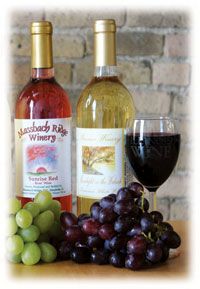Blago Signs Wine Distribution Bill
By Chuck Sudo in Food on Oct 4, 2007 9:54PM
 Governor Blagojevich signed into law late Wednesday HB 429, which brings into balance the amount of wine wineries in and out of Illinois can sell directly to consumers, but prevents out-of-state retailers and wine clubs to sell product directly to customers in Illinois. HB 429 goes into effect June 2, 2008.
Governor Blagojevich signed into law late Wednesday HB 429, which brings into balance the amount of wine wineries in and out of Illinois can sell directly to consumers, but prevents out-of-state retailers and wine clubs to sell product directly to customers in Illinois. HB 429 goes into effect June 2, 2008.
Under the terms of HB 429, smaller wineries with an annual production yield of under 25,000 gallons may sell directly to consumers with the purchase of a permit. This shuts out larger wineries such as Lynfred Winery in Roselle and Galena Cellars Vineyard & Winery, which helped lay the foundation for the increased profile of the Illinois wine industry. Supporters of boutique wine retailers like the Specialty Wine Retailers Association have also threatened to challenge the legality of HB 429 in court. We've been following the debate over HB 429 for months, and feel that this could be a disastrous bill for Illinois wine consumers, as it will limit their selection. As we studied the legislation and talked to people on both sides of the debate, we determined that the biggest winners in HB 429's passage are the state's beer and liquor wholesalers. HB 429 tightens their grip on the three-tier distribution system that governs how liquor and wine reach consumers. By shutting out the out-of-state retailers and wine clubs, it forces larger out-of-state wineries who don't qualify for the permit system to find a wholesaler in Illinois to distribute their product. Given the wide array of specialty and boutique vineyards producing limited yields, finding distribution in Illinois is not a certainty.
Lynfred Winery President and CEO Fred Koehler wrote via e-mail that HB 429 "tak(es) away from Lynfred (and any 2nd class winemaker producing over 25,000 gallons of wine in the state) the right to self distribute 4,100 cases of wine. Losing that right takes away profit that is made by selling that wine directly. That impacts consumers who purchase Illinois wine outside of the winery. By having to sell the wine to a distributor, who in turn sells it to the restaurant, the price goes up for the restaurant wine consumer. Now, to keep consumers happy, the winery will have to shave their profits to keep prices the same, which keeps our industry from growing."
Earlier this afternoon Chicagoist placed a phone call to Brenda Logan, the owner of Baxter's Vineyards in downstate Nauvoo and the Secretary-Treasurer of the Illinois Grape Growers and Vintners Association to get her reaction to the signing.
Chicagoist: What are your feelings toward HB 429?
Brenda Logan: I think it's great. It'll be great for the smallest wineries in Illinois, including my vineyard, and out of state vineyards as it will allow us to reach a wider range of customers because we can now sell directly to them.
C: What is your reaction to the criticism of the larger Illinois wineries who feel that HB 429 isn't looking out for their best interests?
BL: Wineries like Lynfred and Galena have done a wonderful job in raising awareness of the quality, if not the existence itself, of the wine industry in this state. This bill will mean wonderful things for 99 percent of the vineyards in Illinois, and my eyes are on the bigger picture here.
C: Couldn't the concerns of the larger vineyards to sell their product directly to customers have been remedied by calling for a tiered permit system in the legislation?
BL: We tried to do that.
C: Why couldn't it be done, then?
BL: It's something we couldn't agree on. Hopefully, we can amend this in the near future to accommodate the larger wineries.
C: What about the concerns raised by supporters of specialty wine retailers that they'll no longer be able to sell directly to customers in Illinois?
BL: We think that this bill will benefit consumers throughout the state, and we'll continue to work to accommodate the concerns of those retailers. Chicago, in particular, is such a lucrative and desirable market for wine retailers.